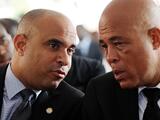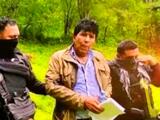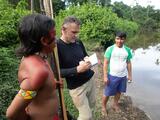Profile in courage: Nicaragua's student leader Lesther Aleman

His political determination and deep baritone voice belie his years. Lesther Aleman is only 20, yet has emerged in recent weeks as a key figure in a student-led movement that is challenging the once seemingly indomitable power of Nicaraguan President Daniel Ortega.
Aleman rocketed into the headlines last month when he boldly challenged Ortega face-to-face at the opening of a national dialogue called to try and resolve month-old protests that have, by the latest count, claimed 105 lives.
Univision reporter Tifani Roberts traveled to Nicaragua to interview Aleman and his family for a profile which aired Sunday on Aqui y Ahora (video is in Spanish).
Aleman's parents live in a poor neighborhood of Managua and they have only seen their son once since he went into hiding after the protests began.
From an early age, Aleman's mother, Lesbia Alfaro, says he was picking up diplomas at school for outstanding achievement, after learning to count and read the alphabet aged three.
She recalled attending meetings at his school. "The first thing they said was 'Please would Lesther's mother stand up.' That made me feel immense pride," she told Univision during an interview in the family home in Managua.
On a mission
When Aleman was 12 his mother underwent surgery for a tumor and he made her a promise.
"She was going to undergo the operation. I remember I was alone on the porch of my house in a wooden rocking chair and I said to God, 'If my mom survives, I will serve you all my life. I committed myself at 12 years old," he told Univision, interviewed at a secret location where he currently lives with more than 40 other student activists.
Since then, he's been as a good as his word, helping others, his mother said.
"Lesther is a missionary. The other day they spent the weekend painting a church, fixing the roof and carrying groceries for the elderly," said Alfaro.
Aleman says that's his purpose in life. "I love to see everyone's ok. It makes me feel reborn. And when someone needs help I like to be ingenious, and find a way to get there and help," he said.
So, it was no surprise that Aleman was quick to join a protest on behalf of poor pensioners when the government announced a sudden reform to the social security system in mid-April that raised taxes and reduced benefits.
"I put my ID in a sock together with 100 córdobas banknote ($3) and left my phone in the house. I had no idea there was going to be such violence because I had never been in a protest before," he said, describing the outbreak of protests on April 18.

Day One of protests
Together with his friends, mostly communications students from the University of Central America (UCA), they were shocked to find themselves under attack from police and pro-government groups on motorbikes, dubbed 'turbas,' ('mob' in English).
"At about 6pm we were told to head for the UCA because of the motorbikes were coming. They are scary because they are armed with steel and wooden baseball bats, anything to beat people with," he said.
In no time they realized their escape route was cut off and they found themselves surrounded by riot police blocking their path. In the chaos they got split up.
"They fired tear gas at us from lethal range, I had no idea before what tear gas smelled like," he said. As soon as he made it to the safety of a house he broke down in tears.
It wasn't from the gas. "We were thinking; why are they trying to kill us? We're kids" Aleman said.
Other universities joined the UCA students. and on the following day the protest was three times the size. The police backed by the Sandinista 'turbas,' indiscriminately attacked them again.
That day the first three deaths were reported.
Relacionados
The rebellion of the Sandinista's grandchildren
"At the same time as we were being attacked, it was incredible to see who the other demonstrators were; women in high heels, men in suits and ties, marching next to us," he recalled.
That day was an eye-opener, Aleman said. "I understood what they were really capable of," he added,, referring to the brutal government tactics.
After four days of protests, which had spread across the country, Ortega revoked the social security reforms. But, there was no going back. By then there were already 40 dead and the university students weren't just seeking justice for the bloodshed, now they wanted Ortega to go.
Aleman explained to his mother that the protests had to continue. He gave her a very personal reason.
"He told me, 'it hurts me to see what they have done to the people who are affected (by the reforms). I wouldn't like to see them do that to you, and that's why I'm doing this," she said.
From one day to the next, the country was paralyzed. Aleman and the students turned to social media to launch road blocks and marches, while the number of dead steadily rose.
Mediation and dialogue
Finally the Catholic Church accepted to mediate a national dialogue to try and stop the violence and find a way out of the political crisis. Aleman was selected as one of the representatives of the UCA students.
"My classmates, my generation, began to make proposals for who would represent us. Everyone was saying 'Lesther.' They did a survey on Facebook, they took it to Twitter and then WhatsApp," he said.
The message that came back was loud and clear, Aleman said. "It was ''Lesther. Lesther, we want you to represent us,'" he said.
On the opening day of the national dialogue more than a dozen students showed up representing the various universities. The night before It was announced that Ortega would also attend and make a speech.
Suspicious that Ortega was simply seeking to buy time and appear conciliatory, the students came up with a strategy to call his bluff. "Why listen to him talk when we are tired of that? What we want is an answer, not speeches," said Aleman.
They decided one of them had to call him out. "The question was who should do it?" Aleman said. He went on: "A consensus was reached that Lesther should do it: because of his voice, the way he expresses himself, and maybe because of his legitimacy."
His mother wasn't so sure he should expose himself so much.
"I felt bad, like any mother. But at the same time I said no, why should we be afraid, if all we are doing is telling the truth, that injustice is being done," she said.
On the day, the Catholic bishops opened the dialogue with a prayer ... that was the sign for Aleman to interrupt the proceedings.
During the prayer, Aleman says he could feel his heart beating fast against his shirt. "I was concentrating because they told me when they get to the 'Amen,' that's the moment," he said.
"We cannot dialogue with a murderer""
He got to his feet and he did not need a microphone to make himself heard. For three minutes he spoke directly to Ortega, who was sitting with his wife, Vice President Rosario Murillo.
"Why am I talking? Why do I interrupt you? Because we are the ones being killed, being kidnapped and disappeared," he told the Ortegas. "This is not a dialogue, this is a negotiating table for your departure (from office) and you know that very well,” he added.
He went on: "We cannot dialogue with a murderer, because what has been committed in this country is a genocide, and that's what it will go down as."
Aleman beseeched Ortega to order an end to the violence by the police and Sandinista paramilitary gangs.
Ortega listened impassively, as the young man tore into him.
When it was his turn, Ortega accused the universities of housing criminals and defended the police saying calling them victims of the violence, while insisting they were only trying to prevent chaos. “You can’t go around attacking police stations. Because it’s not little angels out there — there are guns, too, shooting at police,” he said.
Ignoring the death toll, Ortega complained that roadblocks were preventing people from getting to work, causing unemployment.
At home, Aleman's mother was watching on TV with a mix of fear and pride.
"I believe God gave him that authority in his voice, and what he experienced as a result of this injustice. It gave him courage to confront him (Ortega)," she said.
Threats
But that courage had a price. Threats arrived quickly. The students who participated in the dialogue had to go into hiding. Aleman canceled all of his accounts on social media, and left home to protect his family.
While he recognized the high price, he said he was willing to pay it. "Maybe to a certain extent in the fight one doesn't measure it that much because you say; if they get me, I gave myself willingly. I am doing it for Nicaragua," he said.
"But not my family. That's where my strength is, my perfect nucleus. And what gives me stability too."
He asked Univision not to reveal the neighborhood where his family lives.
Aleman is in hiding with more than 40 other youths while the battle for Nicaragua's democracy goes on. The dialogue has since broken down, and a march last Wednesday, Mother's Day in Nicaragua, saw some of the worst bloodshed so far: another 15 deaths.
Human rights groups have accused the government of targeting protesters, with the use of sharp-shooters, and Nicaragua is sure to be high on the agenda of the Organization of American States when its General Assembly meets on Monday in Washington.
While various sectors of the society are now engaged in talks about the country's future, including the church and the private business sector, it is the students who have indisputably emerged as the people's voice.
"It's not a fight about universities, it's a struggle for Nicaragua," said Aleman who has reluctantly come to accept that his life has forever changed as a result of the political crisis.
"l didn't want to accept that and I don't want to accept the future not being so normal, to be able to go out on the street and not be recognized," he said.
"I go about two blocks and everyone comes up to me. I don't know if that's good or bad."
(Additional reporting by David Adams)




